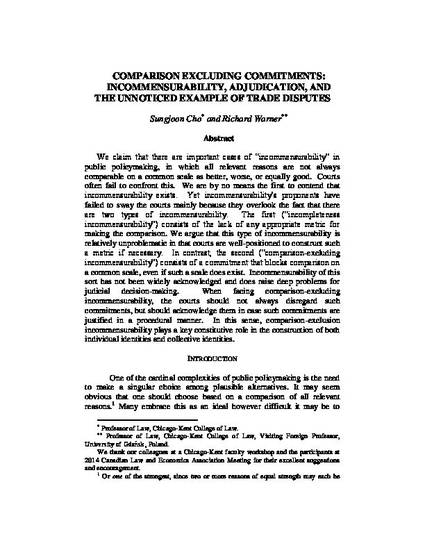
Article
Comparison Excluding Commitments: Incommensurability, Adjudication, and the Unnoticed Example of Trade Disputes
Southern California Interdisciplinary Law Journal
(2016)
Abstract
We claim that there are important cases of “incommensurability” in public policymaking, in which all relevant reasons are not always comparable on a common scale as better, worse, or equally good. Courts often fail to confront this. We are by no means the first to contend that incommensurability exists. Yet incommensurability’s proponents have failed to sway the courts mainly because they overlook the fact that there are two types of incommensurability. The first (“incompleteness incommensurability”) consists of the lack of any appropriate metric for making the comparison. We argue that this type of incommensurability is relatively unproblematic in that courts are well-positioned to construct such a metric if necessary. In contrast, the second (“comparison-excluding incommensurability”) consists of a commitment that blocks comparison on a common scale, even if such a scale does exist. Incommensurability of this sort has not been widely acknowledged and does raise deep problems for judicial decision-making. When facing comparison-excluding incommensurability, the courts should not always disregard such commitments, but should acknowledge them in case such commitments are justified in a procedural manner. In this sense, comparison-exclusion incommensurability plays a key constitutive role in the construction of both individual identities and collective identities.
Keywords
- incommensurability,
- public policy,
- courts,
- judicial decision-making,
- value conflicts,
- reason-exclusion
Disciplines
Publication Date
2016
Citation Information
Sungjoon Cho and Richard Warner. "Comparison Excluding Commitments: Incommensurability, Adjudication, and the Unnoticed Example of Trade Disputes" Southern California Interdisciplinary Law Journal Vol. 26 Iss. 1 (2016) p. 1 - 24 Available at: http://works.bepress.com/sungjoon_cho/81/
